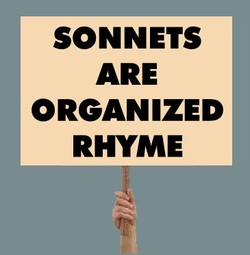
Your sonnet should contain:
1. 14 lines
2. Attempted iambic pentameter (or at least around 10 syllables per line)
3. Shakespearean or Petrarchan rhyme scheme--slant rhyme counts!
4. A 1-2 paragraph response to discuss process and intentions.
Ms. Draper-generated additional notes:
1. Please feel free to post sonnets and/or responses in the comments!
2. In order to receive credit for the assignment, you must take the assignment seriously.
3. Of course, if you are subsequently inspired to write a series of silly, inane sonnets, go for it.
 RSS Feed
RSS Feed